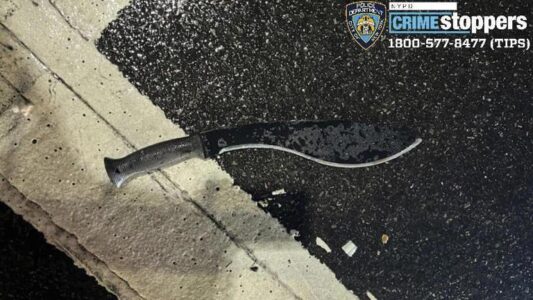
U.S. charges suspect in New York ‘jihad-inspired’ machete attack
Trevor Thomas Bickford was inspired by a known proponent of radical Islamic ideology before he allegedly attacked New York City police officers with a machete at Times Square on Dec. 31, prosecutors said as they announced federal charges against the 19-year-old from Wells, Maine.
Bickford faces four counts of attempted murder of government employees, charges that could land him in prison for 80 years, federal prosecutors said Tuesday. He already faces two counts of attempted murder and two counts of attempted assault from the Manhattan district attorney.
Bickford went to New York days before the attack with plans to travel abroad and “wage jihad,” prosecutors said in a court filing. But instead he decided to “commit jihad” in the United States, they said, canceling his plans to go overseas. On the night of the attack, Bickford went to Times Square to “figure out the right time to kill.” He then prayed before starting the attacks, prosecutors said.
In interviews with investigators, Bickford said he sought out a police officer who had been directing traffic, and began reciting verses from the Quran to “hype himself up.” He then took out a kukri — a machete with a blade over a foot long — from his backpack, prosecutors said. After declaring “Allahu akbar,” an Arabic phrase for “God is great,” according to the filing, Bickford attacked the officer.
In the ensuing mayhem, as he assaulted other officers, Bickford tried to “forcibly remove” a firearm from one officer, according to court documents. Bickford got his hand on the weapon but failed to take it out of the holster. Bickford was then shot in the shoulder, which ended the attack. Bickford said he had acted alone, denying ties to terrorist groups.
In the weeks and months before Bickford’s attacks, the 19-year-old had shown troubling signs to his family, according to court documents. Family members had alerted authorities about his behavior, resulting in an FBI investigation that began last month.
He had expressed a wish to go to the Middle East to become a suicide bomber and join the Taliban, family members said, according to court documents. He had also bought a crossbow that he practiced using daily, the documents show. He repeated some of those goals to his older brother, a member of the U.S. military, in text messages.
Bickford later wrote, in a diary entry that was discovered by law enforcement officials, that he had “no kind words” for his brother, as he had “joined the ranks of my enemy.”
Bickford appears to have closely followed Abu Muhammad al-Maqdisi, a radical Islamic cleric who has mentored members of al-Qaeda, prosecutors said. Al-Maqdisi is a proponent of Salafi Islam, which says that most people, including Muslims, are disbelievers who must be killed by true believers, prosecutors said in court documents.
Bickford began consuming materials that embraced radical Islamic ideology, including YouTube videos, in the previous summer, prosecutors said. In a voluntary interview with the FBI in December, Bickford said he follows a “particular Sheikh” that he appeared reluctant to identify. Prosecutors said they believe Bickford was referring to al-Maqdisi.
Bickford’s legal representatives could not be immediately reached early Wednesday.
Such stories of self-radicalization to Islamic extremism are “actually quite common,” said Heather Williams, a senior policy researcher focusing on violent extremism at the Rand Corp. think tank. Extremist Islamic groups have rarely succeeded in infiltrating the United States using their own members, instead using propaganda to inspire individual Americans to execute violent attacks, she said.
“Bickford intended to die in the attack, in an effort to achieve martyrdom,” the Justice Department said in a news release. “Bickford believed his attack was unsuccessful, because he did not kill any officers, and he did not die himself.”
Source: msn





